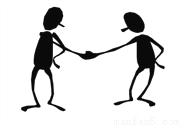题目内容
Parents of very young children know this: You catch your child in the act of stealing the cookie--the evidence of candy written on his or her face. However, you get a wide-eyed denial:”I didn’t do it!”
Learning to tell the truth, even at the risk of punishment, is an important part of moral (道德) development, and new research suggests it can take seven or more years for kids to get there.
Early 2017 Professor Craig E.Smith published a study. He and his workmates chose 48 children between four and nine years of age. They told the kids a story about a boy or girl doing something wrong, such as taking a classmate’s toy or candy, and then either lying about the wrongdoing to a parent or confessing (承认) it. In each case, they asked the children, How would the child feel? How would the mother feel?
The children’s answers answers were generally divided according to age, which is in agreement with the stolen candy, lying and getting unpunished. They imagined the parent in the study would be angry with the child who confessed. However, the seven-to-nine-year-olds were more likely (可能的) to think the child would feel better confessing the crime and that the parent would have positive (积极的) feelings towards a confessor.
Smith says,”Kids of all ages who expect that a parent would feel happy about a child’s confession are more likely to tell the truth rather than lie. Reward the honesty even if you feel you must punish the wrong action.” He adds, what parents can learn from these studies is to listen calmly without getting angry right away when their child confesses.
1.What does the underlined word “denial” in Paragragh 1 mean?
A. 委屈 B. 责备 C. 否认 D. 拒绝
2.Paragragh 2 mainly tell us _________.
A. kids can’t tell “right” from “wrong”
B. it takes time for kids to learn to tell the truth
C. it’s wrong to punish kids for telling the truth
D. all the kids are willing to confess to a bad act
3.What did Smith and his workmates find in their study?
A. Older kids are more likely than younger children to confess to a bad act.
B. Younger children are more likely than older kids to confess to a bad act.
C. The four-to-five-year-olds would feel better confessing the crime
D. The seven-to-nine-year-olds thought parents would be angry with their confessions.
4.According to Professor Smith, what can parents learn from these studies?
A. Parents should at once punish the children who lied.
B. Parents should tell children the wrongness of lying.
C. Parents should never get angry after their children’s confessions.
D. Parents should show positive feeling about their children’s confessions.
1.C 2.B 3.A 4.D 【解析】本文是一篇说明文。文中介绍了当很小的孩子犯了错误时,家长应该以什么样的态度对待孩子。 1.词义猜测题。根据"the evidence of candy written on his or her face"可知,偷吃糖果的证据写在脸上,然而孩子却说"I didn't do it!"显示,孩子是在"否认",故答案选C。 2....Foods that are well known to you may not be familiar to people from different places around the world. Tourists and travelers often get to try some unfamiliar food. That is part of the fun of traveling. Here are four people’s experiences with foreign food.
David King is a Chinese student in France. “I never had cheese or even milk before I came to France. Cows are seldom seen in my part of China. So there is no milk or milk products. I drank some milk when I first arrived in France. I hated it! I tried cheese, too, but I didn’t like it. I love ice cream, though that’s made from milk.” |
Birgit is from Sweden. She traveled to Australia on vocation. “I was in a restaurant that was special in fish. I heard some other people order flake, so I ordered some, too. It was delicious! Later, I learned that flakes is an Australian name for shark. Now, whenever I see a new food, I try it on purpose. You know why? I remember how much I enjoyed flake.” |
Chandra is a dentist in Texas. She is from India. “ I’m afraid to try new foods because maybe there is beef in them. I’m a Hindu(印度教信徒)and my religion(信仰) stops me from eating meat from the cow. That’s why I can’t eat hamburgers or noodles with meatballs.” |
Nathan is from the United States. He taught for a year in China. “My friend gave me some 100-year-old eggs to eat. I didn’t like their appearance at all. The eggs were green inside, but my friends said the color was normal. Chinese people put something on fresh eggs. Then they put them in the earth for three months. So the eggs weren’t really very old. Even so, I didn’t want to touch them.” |
1.David King is a student in France and he comes from________.
A.China B. Sweden C.India D. America
2..Birgit ordered _____in a restaurant during her vocation in Australia.
A. cheese B. eggs
C. hamburgers D. flake
3.Chandra is afraid to try new foods because_________.
A.she can’t eat food with beef
B. she doesn’t like their appearance
C .she doesn’t like foreign food
D. she doesn’t need any food at all
4.Nathan worked as _______ in China for a year.
A. a worker B. a dentist
C.a teacher D. a student
5.The passage tells us that ___________.
A.David King often drinks milk
B. flake and shark are the same fish
C .a Hindu eats meat from the cow
D. the egg is put in the earth for a hundred years
1.A 2.D 3.A 4.C 5.B 【解析】 试题分析:世界各地不同的人们所知晓的食物不一样,品尝各地不同的食物就成了旅途趣味的一部分。本文叙述了四个不同的人在旅游过程中对于不同食物的不同体验。 1.A 细节理解题。题意:David King是一位在法国的学生,他来自哪儿?A.China中国;B. Sweden瑞典;C .India印度;D. Amer...

